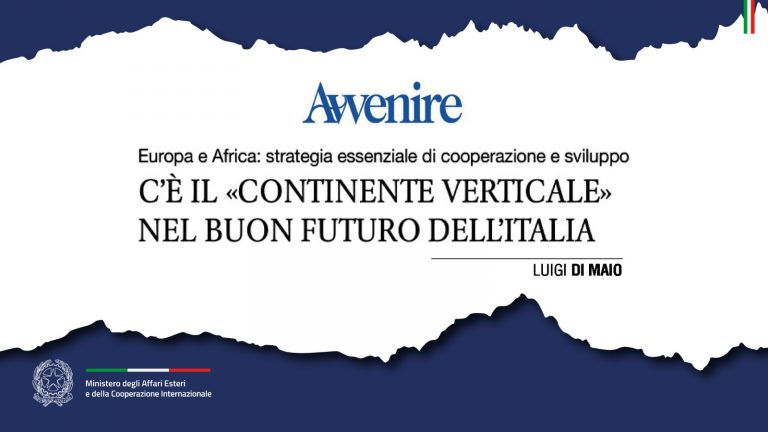Dear Editor,
The African continent is an absolute and long-standing priority for Italian foreign policy. My visit to Ethiopia and Kenya over the coming days is intended to renew the very real contribution our country wishes to make to the stability of a region that, while rich in opportunities, is characterised by tensions that hamper its potential for growth and progress. Since the beginning of my mandate I have visited Africa 23 times. To my visits can be added the regular visits by Deputy Minister Sereni – whose remit includes questions relating to Development Cooperation and relations with the countries of Africa – to that continent, where 11 of Italian Cooperation’s 20 priority countries are located.
In addition, the appointment of Emanuela Del Re – the first woman to hold this position – as the European Union’s Special Representative for Sahel testifies to the increasingly high-profile role played by our country in this geographical region. A region that has come to occupy a strategic position for the security of Europe as a whole and from which arises a demand for assistance for fragile groups in situations of grave crisis. These and other commitments were set out in clear terms in our “Partnership with Africa” strategy document (December 2020), in the knowledge of the vital importance of establishing a long-term strategic vision in relations with a continent that in the coming years is set to become the world’s youngest and most populous.
Ours is a multi-dimensional strategy that aims to ease the way for partnerships between Italian and African companies. We want our country to be well placed to grasp the opportunities offered by the African continent, which will be growing at an ever-faster pace and in which economic transformation and diversification will offer broad and ample scope for our businesses. The potential is significant. In 2021 trade between Italy and Africa amounted to 42.1 billion euro, an increase of 42% on 2020 and of 8.6% on 2019.
With the initiative dedicated to our former Ambassador to the Democratic Republic of the Congo, Luca Attanasio – a project which he had illustrated to us at the Farnesina before his tragic death – we are strengthening our support and assistance for Italian companies in the sub-Saharan region. We are doing so by reinforcing the network of Italian Trade Agency offices, opening new regional hubs in Nairobi and Dakar, and organising sector-based trade missions. We must also look to the future, focusing on partnerships with African countries to foster the energy transition and the successful adoption of renewable energy sources: issues that were at the heart of the third edition of the “Encounters with Africa” Ministerial Conference.
Alongside the opportunities, however, there are also huge challenges: climate change, food and energy security, radicalisation and violent extremism, transnational crime, the sustainability of national debt, and migration. Italy is engaged at both the bilateral and multilateral levels on these fronts, as shown by the actions of the Italian G20 Presidency in the sectors of climate finance and debt reduction for African countries. We are one of the most active countries in the Global Coalition against Daesh, which brings together 85 countries and organisations. The Coalition is distinguished by its multi-dimensional approach to combating terrorism, with a focus on stabilisation, foreign fighters, communication, and combating sources of terrorist funding.
A few weeks ago the Coalition’s Africa Focus Group, created at Italy’s initiative, met in Marrakech. The Group, whose role is to analyse and combat terrorism in Africa, now meets regularly and its activities are fully up and running. The growing participation of African countries is particularly significant: countries such as Niger, which, along with the United States, Morocco and Italy itself, co-chairs the Group’s proceedings. The Africa Focus Group performs a key role in combating terrorism. Italy will continue in its support for the Group, as testimony to the priority status we place on combating terrorism, a phenomenon that we simply cannot underestimate, and the importance of continuing to strengthen and hone the tools at our disposal.
Lastly, at the OECD Ministerial Council Meeting chaired by Italy in Paris on 9 June, at our initiative a working session dedicated to the future partnership between the OECD itself and the African continent was planned. Africa is particularly exposed to the consequences of Russia’s aggression against Ukraine. Its effects, in terms of shortages of wheat, flour, fertilisers and energy resources are already being felt in the economies and debt levels of numerous countries. The meeting organised by Italy, along with the UN Food and Agricultural Organisation (FAO), on 8 June underscores our commitment to helping the countries of North Africa and the Mediterranean reinforce their food supply chains and avert future crises.
The expression “Vertical Continent” refers to the profound interconnections between Europe, the Mediterranean and Africa: three areas affected by common challenges that need to be addressed through shared and agreed solutions. Italy can and must act as a bridge for increasingly close collaboration between our continents. To truly perform its role as a meeting point for different and diverse regions and cultures with a shared destiny, our country needs to take its place as a credible and reliable partner for the countries of Africa. We can do this, and indeed we must.
Luigi Di Maio
Minister for Foreign Affairs and International Cooperation


